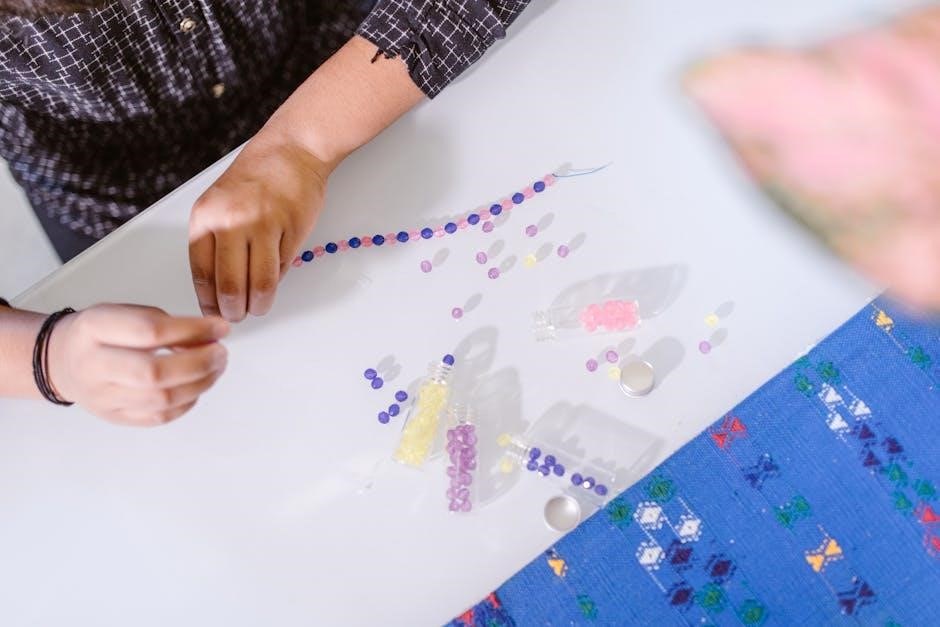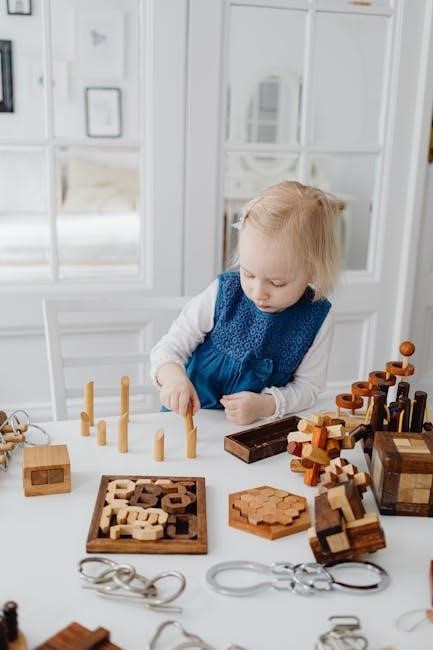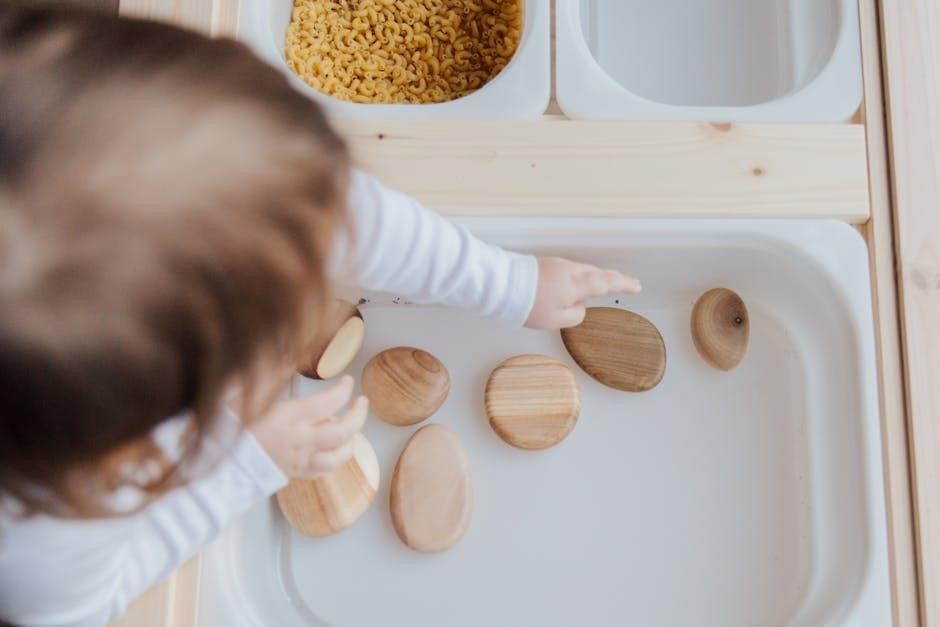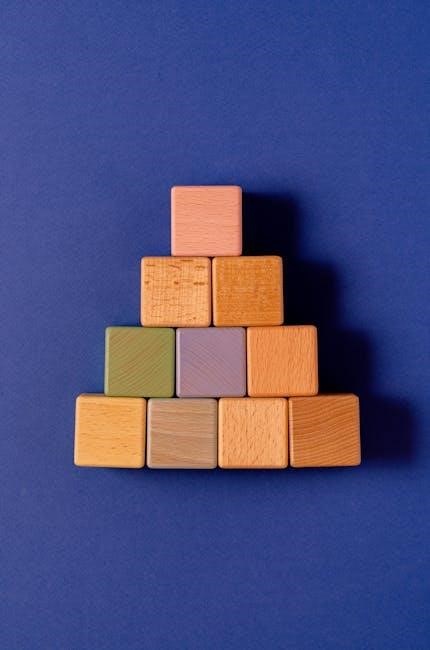Overview of the Montessori Philosophy
The Montessori philosophy emphasizes fostering independence‚ curiosity‚ and respect for individual learning pace. It views children as naturally eager learners‚ encouraging exploration and discovery through specially designed environments.
The Montessori philosophy‚ developed by Dr. Maria Montessori‚ is a child-centered educational approach that emphasizes self-directed learning and hands-on activity. It views children as naturally curious and capable of initiating their own learning when provided with a supportive environment. The philosophy is rooted in scientific observations of children‚ highlighting their unique developmental stages and sensitivities. It advocates for tailored instruction‚ allowing children to explore and discover concepts at their own pace. The role of the teacher is to guide rather than dictate‚ fostering independence‚ critical thinking‚ and creativity. This approach encourages collaborative learning‚ respect for others‚ and a deep connection to the environment. By nurturing the whole child—emotionally‚ socially‚ and cognitively—the Montessori philosophy aims to cultivate lifelong learners prepared to contribute meaningfully to society.
History and Development of the Montessori Curriculum
The Montessori curriculum was developed by Dr. Maria Montessori‚ an Italian physician and educator‚ in the early 20th century. Her groundbreaking work with special-needs children led to the creation of the Montessori method‚ which was later refined for children of all abilities. The curriculum is rooted in scientific observations of children’s developmental patterns and their natural inclination to learn through exploration. Over the years‚ the Montessori curriculum has evolved to address the needs of a changing world while staying true to its core principles. The Montessori Foundation’s revised Scope and Sequence in 2012 further refined the curriculum‚ ensuring it aligns with modern educational standards. Today‚ the Montessori curriculum is internationally recognized and continues to adapt‚ integrating new research while maintaining its commitment to child-centered education and holistic development.

Core Principles of the Montessori Syllabus

The Montessori syllabus is built on self-directed learning‚ mixed-age classrooms‚ and individualized instruction. It emphasizes hands-on activity‚ fostering independence and critical thinking through experiential learning experiences.
Self-Directed Learning and Child-Centered Education
The Montessori syllabus prioritizes self-directed learning‚ allowing children to explore and learn at their own pace. This child-centered approach fosters independence‚ curiosity‚ and a love for learning. By tailoring activities to each child’s interests and developmental stage‚ the curriculum encourages natural growth and creativity. Mixed-age classrooms further enhance this principle‚ enabling older students to mentor younger ones‚ promoting collaboration and social learning. Teachers act as guides‚ observing and supporting rather than directing‚ to create a nurturing environment. Uninterrupted work periods allow children to focus deeply‚ building concentration and problem-solving skills. This approach not only enhances academic achievement but also cultivates emotional intelligence‚ self-confidence‚ and a sense of responsibility. The Montessori method’s flexibility ensures it adapts to diverse learning needs‚ making it a holistic and inclusive educational framework.
Hands-On Activity and Experiential Learning
Hands-on activity is a cornerstone of the Montessori syllabus‚ engaging students through tactile experiences that enhance understanding and retention. Experiential learning encourages children to explore concepts actively‚ using specially designed materials and activities. These tools‚ like sensory boxes or math manipulatives‚ allow learners to interact with abstract ideas concretely. This approach not only deepens comprehension but also builds fine motor skills and hand-eye coordination. Practical life exercises‚ such as pouring or sorting‚ foster independence and practical skills. Field trips and community involvement further enrich learning‚ connecting classroom lessons to real-world applications. By emphasizing active participation‚ the Montessori method ensures that learning is immersive‚ meaningful‚ and tailored to each child’s developmental needs‚ promoting a deeper connection with the material and fostering a lifelong love of learning. This method’s effectiveness lies in its ability to make education both engaging and impactful.
Individualized Instruction and Mixed-Age Classrooms
Montessori education thrives on individualized instruction‚ tailoring learning to each child’s unique pace and interests. Mixed-age classrooms‚ typically spanning three-year age ranges‚ foster a collaborative environment where older students mentor younger peers. This dynamic promotes socialization‚ empathy‚ and mutual respect. Teachers observe and guide students‚ adapting lessons to meet their developmental needs. The mixed-age setting allows for seamless transitions‚ as children progress at their own pace without the constraints of traditional grade levels. This approach encourages independence‚ as students take ownership of their learning journey. The integration of diverse age groups also enriches the classroom culture‚ creating a sense of community and shared growth. By focusing on individual potential and fostering peer-to-peer learning‚ the Montessori method ensures a personalized and enriching educational experience for all students. This structure is a hallmark of the Montessori syllabus‚ emphasizing adaptability and inclusivity.

Montessori Curriculum Structure
The Montessori curriculum is structured into age-specific programs‚ including early childhood (3-6)‚ elementary (6-12)‚ and secondary (12-18). Each stage emphasizes hands-on learning and individualized instruction.
Early Childhood Education ( Ages 3-6 )
The Montessori early childhood program for ages 3-6 focuses on fostering independence‚ curiosity‚ and a love for learning. It incorporates hands-on activities‚ specially designed materials‚ and practical life skills to promote holistic development. The curriculum emphasizes self-directed learning‚ allowing children to explore at their own pace in a prepared environment. Key areas include practical life exercises‚ sensory education‚ language development‚ and cultural studies. Mixed-age classrooms encourage peer-to-peer learning and socialization. Activities are designed to enhance fine motor skills‚ concentration‚ and problem-solving abilities. The program also integrates grace and courtesy lessons to nurture social etiquette and emotional intelligence. By fostering a sense of community and individual responsibility‚ the Montessori method lays a strong foundation for future academic and personal growth. This period is crucial for building confidence and a lifelong passion for discovery.
Elementary Education ( Ages 6-12 )

The Montessori elementary program for ages 6-12 builds on the foundation established in early childhood‚ introducing a more advanced and integrated curriculum. Known as the “cosmic curriculum‚” it explores interconnected themes in science‚ history‚ and culture to spark curiosity and a sense of wonder. Hands-on activities and specially designed materials encourage deeper exploration of subjects like mathematics‚ language‚ and geometry. Mixed-age classrooms foster collaboration and peer-to-peer learning‚ while individualized instruction ensures each child progresses at their own pace. Practical life skills and care of the environment are also emphasized‚ promoting responsibility and stewardship. The program integrates grace and courtesy lessons to nurture social and emotional growth‚ preparing children for adolescence with confidence‚ critical thinking‚ and a love for learning.
Secondary Education ( Ages 12-18 )
The Montessori secondary education for ages 12-18 focuses on fostering independence‚ critical thinking‚ and preparation for adulthood. The curriculum emphasizes practical life skills‚ entrepreneurial activities‚ and community involvement‚ aligning with the Montessori philosophy of “economic independence.” Students engage in hands-on projects that integrate academic learning with real-world applications‚ such as running small businesses or managing school resources. Grace and courtesy lessons continue to nurture social and emotional growth‚ promoting respect and empathy. The program encourages self-directed learning and collaboration‚ preparing adolescents for higher education and future challenges. By balancing intellectual and practical development‚ Montessori secondary education aims to cultivate confident‚ responsible‚ and compassionate individuals ready to contribute to society.

Practical Life Skills in the Montessori Syllabus
Practical life skills are foundational in the Montessori syllabus‚ fostering independence and self-reliance. Activities include daily living tasks‚ environmental care‚ and social etiquette‚ preparing children for real-world responsibilities.

Activities for Independence and Daily Living
Montessori practical life activities focus on fostering independence and self-reliance through everyday tasks. These activities include pouring‚ sorting‚ cleaning‚ and personal care‚ designed to enhance motor skills and coordination. Children learn to perform these tasks independently‚ developing concentration and responsibility. The curriculum emphasizes hands-on experiences‚ allowing children to connect with their environment and build confidence. These activities also promote problem-solving and critical thinking‚ preparing children for more complex challenges. By mastering daily living skills‚ children gain a sense of accomplishment and readiness for future independence. The Montessori syllabus integrates these lessons seamlessly‚ ensuring a holistic approach to learning and personal growth.
Grace and Courtesy Lessons
Grace and Courtesy Lessons are essential in the Montessori syllabus‚ teaching children respect‚ empathy‚ and social skills. These lessons include polite behavior‚ sharing‚ and conflict resolution‚ fostering a harmonious classroom environment. Activities such as role-playing and group discussions help children develop self-awareness and understand the impact of their actions. These lessons not only enhance social interactions but also contribute to the child’s emotional growth‚ preparing them to be compassionate and responsible individuals.

Care of the Environment and Community

Care of the environment and community is a cornerstone of the Montessori syllabus‚ fostering responsibility and stewardship in children. Activities such as cleaning‚ watering plants‚ and recycling encourage children to contribute to their surroundings‚ promoting environmental awareness. These practical tasks help children understand their role in maintaining a orderly and sustainable world. Additionally‚ community involvement is emphasized‚ teaching children the value of collaboration and respect for shared spaces. By participating in group clean-up activities or caring for classroom pets‚ children develop a sense of duty and compassion. This aspect of the Montessori curriculum not only cultivates practical skills but also instills a deep appreciation for the interconnectedness of all living things‚ preparing children to be mindful and contributing members of society.

Leave a Reply